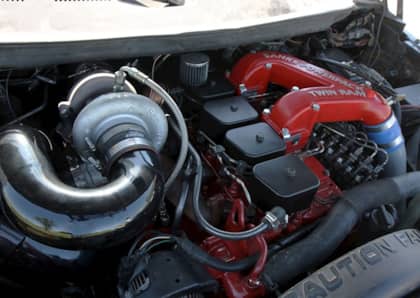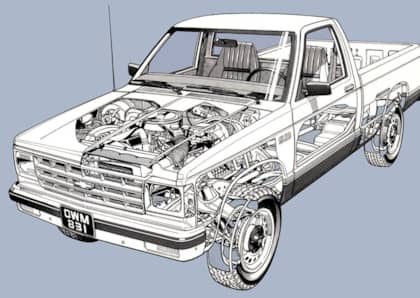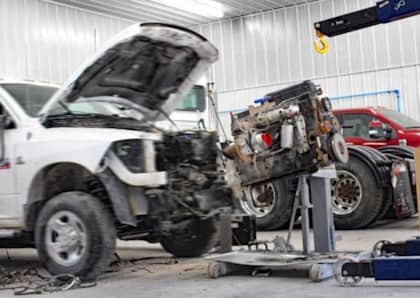The 237 MPH Volkswagen
What do the folks at Kerma TDI do when they’re not helping thousands of diesel VW owners improve the performance of their cars? Well, one of the company’s recent extra-curricular activities has entailed providing support for the Adler brothers’ streamliner named Double Eagle. Sponsored by AG Autowerks, Apex Performance Turbos, Fratelli Bosio and Kerma TDI, the high-speed missile on wheels was built to set land speed records and on September 17th all of the team’s hard work paid off at Bonneville Speedway in northwest Utah. The Volkswagen diesel-powered streamliner would achieve an exit speed of 237.015 mph during its multi-mile run, effectively making it the fastest Volkswagen racer in the world.
One of the more impressive aspects of the streamliner is what it’s propelled by. Remember the 5.0L V-10 TDI Volkswagen offered in its Touareg SUV? Well, a version of the V-10 oil burner with a completely untouched 147,000-mile long block is employed in Double Eagle. That means no overhauls, head gaskets, or even head work—the factory seal has never been broken. A set of Bosio 783 Pumpe Duse DLC race nozzles were added to the factory Bosch unit injectors, replacement fixed geometry twin turbochargers from Apex Performance Turbos provide the engine’s required airflow and Kerma TDI’s custom ECM calibrating ties everything together. Scroll down for a closer look at this record-setting, gravity-bound projectile.
Double Eagle
With long, slender bodies, streamliners resemble spaceships more than race vehicles, but that’s the nature of the beast. In order to overcome the immense wind resistance encountered at speeds greater than 200 mph, aerodynamics play as much a role as horsepower in reaching the vehicle’s target speed. As you can see, the Double Eagle streamliner is not an exception to the rule. And, if you look even closer, you can see the VW badge up front.

Twin Turbos
From the rear three-quarter of the streamliner, you can see the encased engine compartment and dual exhaust. Why does the Double Eagle sport dual exhaust? For those that don’t know, the 5.0L V-10 TDI came equipped with twin turbos from the factory. Of a true “twin” (parallel) configuration, one turbo feeds each bank of the engine. For this high performance application, the factory variable geometry Garrett turbos were replaced with less restrictive, fixed geometry units. Both chargers are based on the BorgWarner K16 and were built by Apex Performance Turbos. Each turbo features a billet Titanium compressor wheel with a 44mm inducer and a 55mm (inducer) x 46mm (exducer) turbine wheel. Both exhaust stacks are cloaked in exhaust wrap and attach to their respective turbine housing via V-band clamp.

5 Liters of Fury
As spec’d for U.S. Touareg models, Volkswagen’s 5.0L V-10 TDI was rated for 310 hp at 3,750 rpm and 553 lb-ft of torque at 2,000 rpm. Displacing 300 cubic inches, the 90-degree engine featured a cast-iron block, forged-steel crankshaft, two-valve aluminum cylinder heads, a single overhead cam and maintenance-free hydraulic lifters. A unit injection system provided as much as 29,700 psi worth of in-cylinder injection pressure.

The 5.0L V-10 was particularly interesting at the time of its release due to it forgoing the use of external drive belts or a mechanical fan. Instead, accessories were gear driven off of the crankshaft (just below the driver side exhaust manifold).

Mild Engine Mods
Believe it or not, the V-10 TDI in the Double Eagle streamliner isn’t much different from the factory version. Plucked from a 147,000-mile Touareg, the long block is 100-percent stock. The only modifications performed beneath the valve covers entailed fitting the injectors with Bosio 783 Pumpe Duse DLC race nozzles, which provide a 163-percent increase in flow over stock. The aforementioned variable geometry OEM turbochargers were scrapped in favor of higher flowing, BorgWarner K16-based units from Apex Performance Turbos, along with a water-to-air intercooler to keep intake air and exhaust gas temps safe. Last but not least, the factory Bosch EDC-16 ECM was uploaded with tuning from Kerma TDI. Sitting on top of the radiator in the photo above, a Kerma TDI Q Pro tuner is plugged into the factory ECM wiring harness. The wiring harness itself had to be folded over on itself due to its length and it was also wrapped in a heat shielding material to protect it. The six-speed Aisin transmission that backs up the engine is also a completely untouched, factory component.

Custom Tuning Go-Between
Kerma TDI’s Q Pro flash programmer serves as the catalyst for uploading custom tuning files onto the 5.0L engine’s ECM. As a calibrator, Kerma TDI’s job was to tie all of the engine’s modifications together. Thanks to Kerma TDI’s custom tuning, the V10 diesel not only cranks out enough horsepower to achieve 237 mph, but it does it by keeping temperatures in check and the engine from coming apart. The folks at Kerma TDI told us exhaust gas temperature (EGT) never exceeded 1,400 degrees (Fahrenheit) and that combined boost peaked at a fairly conservative 24 psi on the streamliner’s record-setting pass. In layman terms, that means there is a lot of power left on the table.

Aerodynamic Lines
Typical of streamliners, all of Double Eagle’s wheels are enclosed by contoured body panels. The aforementioned powertrain package was put together (and the chassis tweaked) by A&G Autowerks of Ventura, California and Adler Landspeed. Brothers Davidson and Doug Adler have been campaigning the Double Eagle for the past six years.

1 Weekend, 2 Records
Driver Davidson Adler prepares to turn the Double Eagle loose on the Bonneville Salt Flats. He was the one in the driver seat when the streamliner earned the fastest Volkswagen racer record. That same weekend, the team would also lay claim to the Diesel 5.0L-and-under world record, as sanctioned by the Southern California Timing Association (SCTA).

Proof in Numbers
Notice the 237 mph exit speed at the bottom of the slip, which earned the streamliner the fastest Volkswagen racer designation at the 31st World of Speed event in Bonneville. Not bad for a Volkswagen TDI!

What’s Next?

Future plans for the Double Eagle endeavor include pursuing the overall fastest diesel record. This will require another 82 mph, but it’s a challenge that all parties involved are looking forward to.
Photography provided by Kale Siess, Barry Burly Burlile and Terry Wolfe







